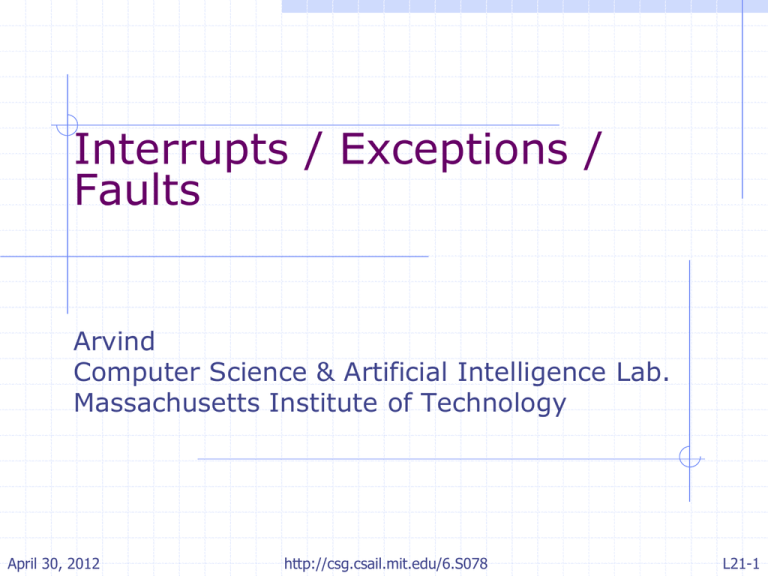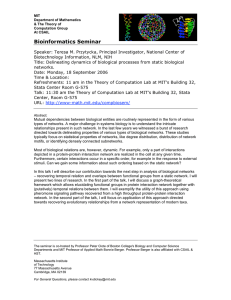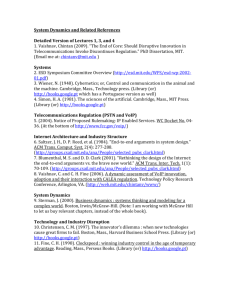Interrupts / Exceptions / Faults Arvind Computer Science & Artificial Intelligence Lab.
advertisement

Interrupts / Exceptions /
Faults
Arvind
Computer Science & Artificial Intelligence Lab.
Massachusetts Institute of Technology
April 30, 2012
http://csg.csail.mit.edu/6.S078
L21-1
Interrupts:
altering the normal flow of control
Ii-1
program
HI1
Ii
HI2
Ii+1
HIn
interrupt
handler
An external or internal event that needs to be processed by
another (system) program. The event is usually unexpected or
rare from program’s point of view.
April 30, 2012
http://csg.csail.mit.edu/6.S078
L21-2
Causes of Interrupts
events that request the attention of the processor
Asynchronous: an external event
input/output device service-request
timer expiration
power disruptions, hardware failure
Synchronous: an internal event (a.k.a
exceptions, faults and traps)
April 30, 2012
undefined opcode, privileged instruction
arithmetic overflow, FPU exception
misaligned memory access
virtual memory exceptions: page faults,
TLB misses, protection violations
traps: system calls, e.g., jumps into kernel
http://csg.csail.mit.edu/6.S078
L21-3
Asynchronous Interrupts:
invoking the interrupt handler
An I/O device requests attention by asserting
one of the prioritized interrupt request lines
When the processor decides to process the
interrupt
April 30, 2012
Precise interrupt: It stops the current program at
instruction Ii, completing all the instructions up to Ii-1
It saves the PC of instruction Ii in a special register
(EPC)
It disables interrupts and transfers control to a
designated interrupt handler running in the kernel
mode
http://csg.csail.mit.edu/6.S078
L21-4
Interrupt Handler
Saves EPC before enabling interrupts to allow
nested interrupts
need an instruction to move EPC into GPRs
need a way to mask further interrupts at least until
EPC can be saved
Needs to read a status register that indicates
the cause of the interrupt
Uses a special indirect jump instruction ERET
(return-from-exception) which
April 30, 2012
enables interrupts
restores the processor to the user mode
restores hardware status and control state
http://csg.csail.mit.edu/6.S078
L21-5
Synchronous Interrupts
A synchronous interrupt is caused by a particular
instruction and behaves like a control hazard
requires undoing the effect of one or more partially
executed instructions. Comes in two varieties:
Exception: The instruction cannot be completed
and needs to be restarted after the exception
has been handled
information about the exception has to be recorded and
conveyed to the exception handler
Faults (aka Trap): Like a system call and the
instruction is considered to have been completed
April 30, 2012
requires a special jump instruction involving a change
to privileged kernel mode
http://csg.csail.mit.edu/6.S078
L21-6
Synchronous Interrupt
Handling
PC
Inst.
Mem
PC address
Exception
D
Decode
Illegal
Opcode
E
+
M
Overflow
Data
Mem
W
Data address
Exceptions
Overflow
Illegal Opcode
PC address Exception
Data address Exceptions
...
April 30, 2012
http://csg.csail.mit.edu/6.S078
L21-7
PC address
Exception
Select
Handler
PC
Kill F
Stage
D
Decode
E
Illegal
Opcode
+
M
Overflow
Data
Mem
Data address
Exceptions
Ex
D
Ex
E
Ex
M
PC
D
PC
E
PC
M Asynchronous
Kill D
Stage
Kill E
Stage
Interrupts
1. An instruction may cause multiple exceptions; which
one should we process?
2. When multiple instructions are causing exceptions;
which one should we process first?
April 30, 2012
http://csg.csail.mit.edu/6.S078
W
Cause
Inst.
Mem
PC
Commit
Point
EPC
Exception Handling
Kill
Writeback
L21-8
Exception Handling - priorities
Hold exception flags in pipeline until commit
point (M stage)
Exceptions in earlier pipe stages override later
exceptions for a given instruction
Inject external interrupts at commit point
(override others)
If exception at commit: update Cause and EPC
registers, kill all stages, inject handler PC into
fetch stage
April 30, 2012
http://csg.csail.mit.edu/6.S078
L21-9
A specific example to illustrate
the transfer of control back and
forth between hardware and
software
A multiply instruction that is
implemented in software
(Fault/Trap)
April 30, 2012
http://csg.csail.mit.edu/6.S078
L21-10
fEpoch
2-Stage pipeline
PC
+4
nextPC
Register File
eEpoch
Execute
Decode
itr
Inst
Memory
April 30, 2012
stall
http://csg.csail.mit.edu/6.S078
Data
Memory
L21-11
Additional Features for
Exceptions/Faults
instruction: mult ra, rb
causes a fault
instruction: eret
returns from an exception/fault handler sub-routine
register: epc
April 30, 2012
holds pc+4 of instruction that causes exception/fault
http://csg.csail.mit.edu/6.S078
L21-12
Decode – additional type defs
Bit#(6) fcMULT
Bit#(5) rsERET
= 6'b011000;
= 5'b10000;
typedef enum {None, Mult, Eret}
Excep deriving (Bits, Eq);
See L07-15 for details
typedef struct {
...
Excep excep;
} DecodedInst deriving(Bits, Eq);
typedef enum {Nop, Alu, Ld, St, J, Jr, Jal, Jalr, Br}
IType deriving(Bits, Eq);
April 30, 2012
http://csg.csail.mit.edu/6.S078
L21-13
Decode
function DecodedInst decode(Data Inst);
DecodedInst dInst = ?;
...
RAlu: begin
dInst.iType = funct==fcMULT ? Nop : Alu;
if(funct==fcMULT) dInst.excep = Mult;
...
end
Other: begin
if(rs==rsERET) begin
dInst.iType = Nop;
dInst.excep = Eret;
end
...
end
return dInst;
endfunction
http://csg.csail.mit.edu/6.S078
April 30, 2012
L21-14
Execute
typedef struct {
...
Excep excep;
} ExecInst deriving(Bits, Eq);
function ExecInst exec(DecodedInst dInst, Data rVal1,
Data rVal2, Addr pc, Addr epc);
ExecInst eInst = ?;
...
eInst.addr =
dInst.excep==Eret ? epc :
dInst.excep==Mult ? 32'h1010 :
memType(dInst.iType) ? aluRes :
brAddr;
eInst.excep = dInst.excep;
return eInst;
endfunction
http://csg.csail.mit.edu/6.S078
L21-15
April 30, 2012
2-Stage pipeline with Exceptions
module mkProc(Proc);
Reg#(Addr)
pc
Reg#(Addr)
epc
RFile
rf
IMemory
iMem
DMemory
dMem
Reg#(Bool)
fEpoch
Reg#(Bool)
eEpoch
<<<<<<<-
mkRegU;
mkRegU;
mkBypassRFile;
mkIMemory;
mkDMemory;
mkReg(False);
mkReg(False);
SPipeReg#(TypeDecode2Execute) itr
<- mkSPipeReg(getDstD2E);
FIFOF#(TypeNextPCE) nextPC
<- mkBypassFIFOF;
April 30, 2012
http://csg.csail.mit.edu/6.S078
L21-16
2-Stage pipeline with Exceptions
doFecth Rule
rule doFetch (itr.notFull);
let inst = iMem(pc);
let dInst = decode(inst);
let stall = itr.search(dInst.src1, dInst.src2);
if(!stall)
begin
let rVal1 = rf.rd1(fromMaybe(dInst.src1));
let rVal2 = rf.rd2(fromMaybe(dInst.src2));
itr.enq(TypeDecode2Execute{pc:pc,
epoch:fEpoch, dInst:dInst,
rVal1:rVal1, rVal2:rVal2});
if(nextPC.notEmpty) begin
npc
= nextPC.first.npc;
nepoch = nextPC.first.nepoch;
pc <= npc; fEpoch <= nepoch; nextPC.deq;
end
else pc <= pc+4;
end
endrule
April 30, 2012
http://csg.csail.mit.edu/6.S078
L21-17
2-Stage pipeline with Exceptions
doExecute Rule
rule doExecute (itr.notEmpty);
let itrpc=itr.first.pc;
let dInst=itr.first.dInst;
let rVal1=itr.first.rVal1;
let rVal2=itr.first.rVal2;
if(itr.first.epoch==eEpoch) begin
let eInst = execute(dInst, rVal1, rVal2,
itrpc, epc);
let memData <- dMemAction(eInst, dMem);
regUpdate(eInst, memData, rf);
if(eInst.missPrediction || eInst.excep!=None)begin
let nepoch = next(epoch); eEpoch <= nepoch;
nextPC.enq(TypeNextPCE{npc:eInst.addr,
nepoch:nepoch});
end
if(eInst.excep!=None) epc <= itrpc + 4;
end
itr.deq;
endrule endmodule
April 30, 2012
http://csg.csail.mit.edu/6.S078
L21-18
Software Considerations
00001000 <__start>:
1000:
3c1d0002
1004:
0c000449
1008:
00000000
100c:
00000000
1010:
08000408
...
00001020 <mult_excep>:
1020:
24890000
1024:
24aa0000
1028:
24020000
102c:
24070020
...
104c:
42000018
00001124 <main>:
...
11a0:
00850018
April 30, 2012
lui $sp,0x2
jal 1124 <main>
nop
nop
j 1020 <mult_excep>
addiu $t1,$a0,0
addiu $t2,$a1,0
li $v0,0
li $a3,32
eret
mult $a0,$a1
http://csg.csail.mit.edu/6.S078
L21-19
Realistic exception
handling
State per instruction for storing the cause of
exception (cause)
State per instruction for storing pc of the
instruction that causes exception (epc)
Instructions to transfer cause and epc to/from
GPRs
Processor state for enabling/disabling interrupts
to allow nested interrupts (status)
Privileged/user mode to prevent user programs
from causing harm to other users or OS
Usually speed is not a paramount concern in
handling exceptions
April 30, 2012
http://csg.csail.mit.edu/6.S078
L21-20


